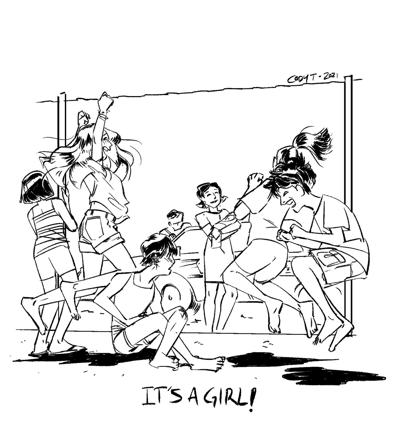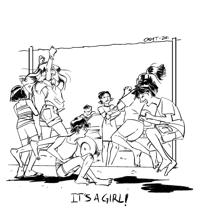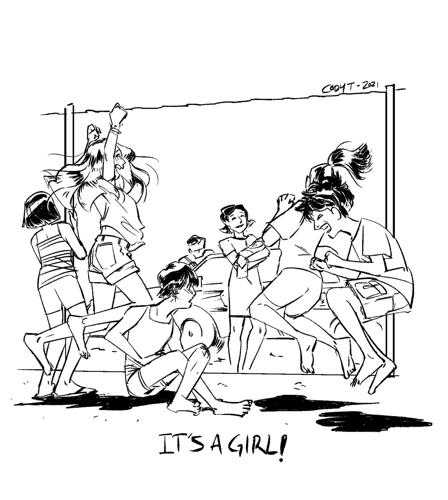A good friend advised me to focus on the good memories.
And, so I have.
At the top of the list is the sheer joy I recall from a half-century ago. With five children, ages 7 to 14, my past-40 mother believed she was done having kids. Another one?
The call from the hospital came about 7 p.m. March 27, 1967. Coleen Patricia had arrived.
We sibs ran out to the back porch, jumping up and down exuberantly, yelling to the world, “It’s a girl! It’s a girl!”
My mother needn’t have worried. There were five wanna-be parents on that porch and we all did our part to help bring up our littlest one.
As the years passed, she lived with me and my husband for several of her teen years and with my older sister as a young adult.
I remember marathon Parcheesi duels, where we kept track of our wins and losses on the game box lid (I still have it), and a wacky night where Coleen and I climbed atop my 4-year-old’s toy box, entertaining him with our performance of the “Grecian urn” scene from “The Music Man.”
We helped her get through her first two years of college while she helped us raise our babies. A talented mom-in-waiting, she charted every nuance of my infant son Philip’s progress after I returned to work, and she miraculously got him over his pacifier addiction.
We all looked forward to the day when she would have babies of her own to care for.
But not long after she wed, Coleen discovered her difficulty in becoming pregnant was wired into her DNA. She was diagnosed with Turner syndrome, a genetic condition defined by a shortage of the X chromosome. Not only was she likely infertile, she also faced a prognosis of future health problems like diabetes and poor kidney function, and a shorter life expectancy.
Although she was a superb musician, the most talented in our musically inclined family, Coleen made that part of her life a sideline as she pursued motherhood with a vengeance. She and her husband fostered six children, adopting two.
Along that path, three sisters came into their lives and stayed for two and a half years. By the time they were returned to their precarious biological family, those girls were indelibly knit into my sister’s heart. That loss, and other personal struggles, were knockdowns in a life that already had more than its share.
I always thought it my role to guide my 12-years-younger sibling through life, but I found out she would be the one teaching me.
One instance happened in 2009. Sitting around my kitchen table with my three sisters, I was trying to impress upon them how difficult life had become. Our parents, both with terminal illnesses, had moved in with us. My husband had lost his job and our baby grandson had suffered a brain injury in a fall.
They had all come to support me, but I just didn’t think they fully grasped my misery.
Coleen, who now lived distant, had made the journey, too, despite her own growing struggles with mobility. Doctors couldn’t say why, but her muscles were weakening and the predicted diabetes had set in viciously.
Her voice trembling a little, she softly said, “A lot of bad things have happened to me.”
No other words were needed to shut me right up, coming from someone I had never known to complain about the course of her life.
Our parents died with dignity a few weeks afterward, my husband landed a good job and our grandson beat the odds to become the admirable 12-year-old he is today.
Coleen’s life would only get harder, but she found purpose and joy anyway.
Progressing from scooter to wheelchair, she finished her undergraduate and graduate degrees to become a compassionate teacher for mentally disabled students. The work was especially hard for someone who was physically disabled herself, but she excelled at it.
At home, two baby grandchildren came into her care. Despite her challenges, she found true joy in meeting their physical and emotional needs, setting them on the road to becoming exceptional humans.
Life got even tougher a year and a half ago, when Coleen caught a rare form of influenza and ended up in an induced coma while fighting pneumonia and a stroke. After weeks of hospitalization and rehab, she proved her doctors wrong by clawing her way back to life.
She had to relinquish her job, but eagerly picked up her grandmother-in-residence duties against a backdrop of worsening kidney function.
Coleen put up a fierce fight to stay here – those kids needed her! – but eventually she realized her job was done.
And then she showed me how to die.
In my last visit with her, she told me she wasn’t sad, and the next day she told her husband she wasn’t scared. In the hours before discontinuing dialysis and entering hospice, she helped him plan her memorial service, dictating that it be a family event.
We held it in a spot that was dear to her heart, outdoors on a windy spring day, during a prayed-for break in the rain.
She told him to tell us not to cry. And we did our best.






